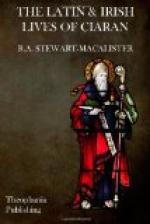Parallels.—We have already noted the use of wild animals by Irish saints. Findian yoked stags to draw wood (LL, 2552). Patrick kept a tame stag (TT, p. 28, cap. lxxxii, etc.). In incident XXXVII, Ciaran is again served by a stag. Cainnech, like Ciaran, made a book-rest of the horns of a stag (CS, 383), and books which Colum Cille had lost were restored to him by a stag (TT, Quinta Vita, p. 407). In the life of Saint Cadoc we read an incident which combines docile stags drawing timber and a forgotten book untouched by rain (Cambro-British Saints, pp. 38, 329).
For Ciaran’s prompt obedience to the summoning sound of the bell, compare what is told of Cainnech, who happened to be summoned by the head of the monastic school when he was writing, and left the letter O, which at the moment he was tracing, unfinished, to obey the call (VSH, i, 153).
There is a parallel in incident XXXVI for the book unwet by rain. Books written by Colum Cille could not be injured by water (LL, 956). It is perhaps hardly necessary to infer with Plummer (VSH, i, p. cxxxviii) that this was a myth of solar origin.
XXII. THE STORY OF CIARAN’S GOSPEL (LA, VG)
This striking anecdote is unique, and probably founded on an authentic incident. The two versions before us differ in some respects, as a comparison will show. The story is told in another form in the Quinta Vita Columbae (TT, p. 403) to the effect that “Once Saint Kieranus, whom they call the Son of the Wright, on being asked, promised Columba that as he was writing a book of the Holy Gospels, he would write out the middle part of the book. Columba, in gratitude to him, said, ’And I,’ said he, ’on behalf of God, promise and foretell that the middle regions of Ireland shall take their name from thee, and shall bring their taxes or tribute to thy monastery.’” The same version appears in O’Donnell’s Life of Colum Cille (printed text, p. 128). Yet another version appears in the glosses to the Martyrology of Oengus (9th September), according to which Colum Cille wished to write a gospel-book, but no one except Ciaran had an exemplar from which to make the copy. Colum Cille went to Ciaran’s cell and asked for the loan of the book; Ciaran, who was preparing his lesson, and had just come to the words Omnia quaecumque, etc., presented him with it. “Thine be half of Ireland!” said Colum Cille. It is worth passing notice that the verse in question, here treated as the central verse of the gospel, is not one-fifth of the way through the book. Had the original narrator of the tale a copy with misplaced or missing leaves?
The Stanza in VG.—This is apparently slightly corrupt, but the metre is evidently meant to be ae freslige. It probably belongs to one poem with the previous stanzas in the same metre: its first line echoes the stanza in incident XIX. Literally, “With Findian read / Ciaran the pious, with diligence // he had half a book without reading / half of Ireland his thereafter.”




